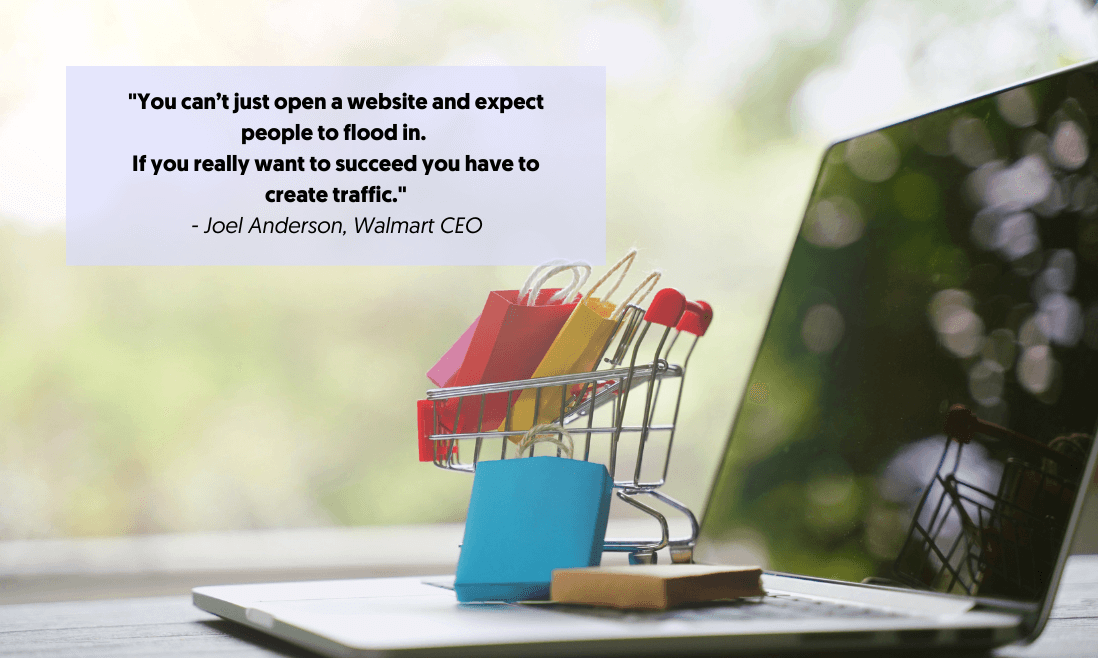In this fast-changing online market, it’s really helpful to listen to the advice of those who’ve already made it. Think of big names like Jeff Bezos from Amazon or Tony Hsieh from Zappos. Their words aren’t just inspiring—they’re like secret tips for doing well in online business.
In this blog post, we’re going to look closely at what these experts have said. We’ll see how their smart advice can help us do better in our own ecommerce adventures. Let’s dive into these great quotes and discover how they can help us grow our online stores in a world that’s always changing.
Contents
Business Principles
“When you say it, it’s marketing. When your customer says it, it’s social proof.”
– Andy Crestodina, Co-Founder of Orbit Media Studios
This quote from Andy Crestodina, a notable figure in digital marketing, highlights a fundamental principle in ecommerce: the power of social proof.
When an ecommerce business markets its products, it’s presenting a controlled narrative. This is essential, but it’s still seen as self-promotion. However, when customers share their experiences—be it through reviews, testimonials, social media posts, or word-of-mouth—it carries more weight.
This is because potential customers perceive this feedback as more authentic and trustworthy. It’s an endorsement that comes from experience, not a sales pitch.
“Your most unhappy customers are your greatest source of learning.”
– Bill Gates, co-founder of Microsoft
This quote by Bill Gates underscores the value of feedback from dissatisfied customers as a key learning tool. In the ecommerce world, where direct customer interaction is limited compared to brick-and-mortar stores, understanding and addressing customer grievances becomes crucial.
Unhappy customers provide firsthand insights into the shortcomings of your product or service, website user experience, customer service, or other aspects of your business. Their complaints highlight areas that need improvement, which might not be evident from positive feedback alone.
By listening to these customers, ecommerce businesses can identify and rectify issues, leading to a better overall customer experience.
“Amazing things will happen when you listen to the consumer.”
– Jonathan Mildenhall, former CMO of Airbnb
Understanding the voice of the customer is crucial. This involves not just gathering data on consumer behavior but also engaging in meaningful dialogue through social media, customer surveys, and review platforms. Listening to consumers helps businesses tailor their products, services, and overall shopping experience to better meet customer needs and expectations.
Mildenhall’s quote serves as a powerful reminder of the value of consumer insights in driving business success. It suggests that when businesses truly listen to and understand their consumers, they can create more meaningful, relevant, and successful products and experiences.
“You are what you do, not what you say you’ll do.”
– Carl Gustav Jung
A brand’s reputation and customer trust are built through consistent and reliable actions, not just marketing promises. For ecommerce businesses, this means that delivering quality products, ensuring timely delivery, and providing excellent customer service are crucial.
These actions speak louder than any advertising campaign. Customers remember and appreciate the businesses that fulfill their promises and meet their expectations, leading to repeat business and positive word-of-mouth.
“Data data data, I can’t make bricks without clay.”
– Sir Arthur Conan Doyle
This quote from Sir Arthur Conan Doyle, while originally pertaining to detective work in the Sherlock Holmes series, aptly applies to the world of ecommerce. It underscores the critical role of data in decision-making and strategy formulation in the ecommerce sector.
Just as a detective needs evidence (clay) to form conclusions (bricks), an ecommerce business requires data to make informed decisions and develop effective strategies. Without data, ecommerce businesses would be making decisions in the dark, leading to inefficiencies and missed opportunities.
Advertising And Driving Traffic

“You can’t just open a website and expect people to flood in. If you really want to succeed you have to create traffic.”
– Joel Anderson, Walmart CEO
Anderson’s quote is a reminder that in the competitive world of online retail, businesses must continually work to attract and retain customers. Success in ecommerce is not just about having a great product or an attractive website; it’s about effectively leveraging digital marketing strategies to bring consumers to your digital doorstep.
Furthermore, this quote suggests that ecommerce success is proactive, not passive. It involves understanding your target audience, how they shop online, and what drives their purchasing decisions. By actively engaging in these practices, ecommerce businesses can increase their website’s visibility, attract more visitors, and ultimately, convert these visitors into customers.
“You can’t wait for customers to come to you. You have to figure out where they are, go there and drag them back to your store.”
– Paul Graham, Y Combinator
This quote from Paul Graham, a prominent figure in the startup world as a co-founder of Y Combinator, conveys a proactive and aggressive approach to customer acquisition in ecommerce. It emphasizes the importance of not just passively waiting for customers but actively seeking them out where they are most likely to be found.
Additionally, Graham’s quote suggests using targeted marketing strategies to attract customers to your online store. This can include tactics like social media marketing, influencer collaborations, content marketing, and targeted ads. These strategies should be tailored to the specific interests and behaviors of the target audience to effectively capture their attention and direct them to your ecommerce site.
Brand Identity
“Create content that teaches. You can’t give up. You need to be consistently awesome.”
– Neil Patel, co-founder of CrazyEgg
Patel emphasizes the importance of educational content — that is, content that provides value by teaching the audience something new or helping them solve problems. Such content helps in establishing the brand as a knowledgeable and trustworthy source in its field, which can build customer loyalty and trust.
Patel’s emphasis on consistency and excellence is also crucial. In the digital world, where content is abundant, to stand out, content needs to be not only informative and relevant but also engaging and of high quality. It should reflect the brand’s values and resonate with the target audience’s interests and needs.
“Innovation distinguishes between a leader and a follower.”
– Steve Jobs
This quote from Steve Jobs, a visionary in technology and co-founder of Apple, speaks to the heart of what drives success in the highly competitive and fast-paced world of ecommerce. He emphasized the critical role of innovation in setting apart leaders from followers in any industry.
In the context of ecommerce, innovation can be interpreted in various ways. It could mean implementing cutting-edge technology to enhance the online shopping experience, like using AI for personalized recommendations, or AR for virtual product trials. It could also involve creative marketing strategies, unique product offerings, or a novel approach to customer service.
Innovation in ecommerce is not just about being different for the sake of it, but about finding new, more efficient, and more engaging ways to meet customer needs and expectations. It’s about staying ahead of industry trends and being willing to take risks to introduce something new to the market.
“The reason it seems that price is all your customers care about is that you haven’t given them anything else to care about.”
– Seth Godin, Founder of Squidoo.com
Godin’s quote is a reminder that to stand out in the crowded ecommerce market, businesses need to give customers reasons to choose them over competitors that extend beyond price. It’s about creating a connection with customers that’s based on the entire value your brand and products bring to their lives, not just the cost.
In the context of ecommerce, this quote underscores the importance of building a unique brand value proposition beyond just competitive pricing. This can include offering exceptional customer service, providing high-quality products, creating an engaging and user-friendly website experience, ensuring fast and reliable shipping, or developing a strong brand story and identity.
Customer Service & Communications

“Customer service shouldn’t just be a department, it should be the entire company.”
– Tony Hsieh, CEO of Zappos
This quote from Tony Hsieh, the CEO of Zappos known for revolutionizing customer service in ecommerce, highlights the fundamental role of customer service in the overall business strategy. Hsieh asserts that customer service should not be confined to a single department but should be a core value that permeates the entire company.
This approach can transform customer service from a reactive, problem-solving department into a proactive driver of customer loyalty and business growth. When the entire company embodies the principles of excellent customer service, it not only improves the customer experience but also fosters a positive brand image and reputation.
“If you’re competitor-focused, you have to wait until there is a competitor doing something. Being customer-focused allows you to be more pioneering.”
– Jeff Bezos, founder of Amazon
Bezos’ quote implies that by understanding and anticipating customer needs, businesses can develop unique solutions and offerings that set them apart in the marketplace. This customer-centric strategy can lead to the development of new market niches and opportunities, helping a business to lead rather than follow.
In the context of ecommerce, being customer-focused means prioritizing the needs, preferences, and satisfaction of the customers in every aspect of the business. This approach encourages continuous innovation to improve the customer experience, whether it’s through enhancing the website interface, diversifying product offerings, streamlining the checkout process, or improving customer service.
“Communication is at the heart of ecommerce and community.”
– Meg Whitman, former president and CEO of eBay
This quote from Meg Whitman, who played a pivotal role in shaping eBay into a global ecommerce leader, underscores the importance of communication in the realm of ecommerce. Whitman highlights that effective communication is not just a business tool, but the very foundation upon which ecommerce and online communities are built.
The rise of social media and online communities has made two-way communication between businesses and customers more important than ever. Customers now expect not just to receive information, but to engage in dialogue with brands. This interaction fosters a sense of community and belonging, which can enhance customer loyalty and advocacy.
“For you to achieve your goals, visitors must first achieve theirs.”
– Bryan Eisenberg, Marketing Expert, Author and Speaker
Eisenberg’s quote serves as a reminder that the path to achieving business objectives in the digital marketplace is paved by prioritizing and fulfilling the needs of the website visitors. When customers find value and satisfaction in their interactions with an ecommerce site, they are more likely to convert, return, and recommend the site to others.
This means that a website should be designed and managed with the customer’s objectives in mind. Whether a visitor comes to the site looking to buy a specific product, to compare prices, to learn more about a product category, or simply to browse, the website should facilitate these goals in an efficient and satisfying manner.
Motivation
“The sooner we drop the ‘e’ out of ‘e-commerce’ and just call it commerce, the better.”
– Bob Willett, former president of Best Buy International
Willett’s perspective suggests that the distinction between ‘e-commerce’ and ‘commerce’ is becoming less relevant as online and offline retail experiences integrate and influence each other.
Consumers might research products online before purchasing in-store, or they might visit a physical store to examine products before buying them online. This omnichannel approach to shopping indicates that businesses can no longer think of ecommerce as a separate entity from traditional retail; rather, it should be an integrated part of their overall retail strategy.
The quote is a reminder that in the increasingly interconnected world of retail, the success of a business hinges on its ability to adapt and offer a cohesive, comprehensive shopping experience that encompasses both online and offline channels. The future of retail lies in the convergence of these channels, transcending the traditional boundaries of ‘e-commerce’ and ‘brick-and-mortar’ stores.
“We see our customers as invited guests to a party, and we are the hosts. It’s our job every day to make every important aspect of the customer experience a little bit better.”
– Jeff Bezos, founder of Amazon
This quote from Jeff Bezos, the founder of Amazon, encapsulates a customer-centric philosophy that has been a cornerstone of Amazon’s success. Bezos likens customers to “invited guests to a party,” with the business acting as the gracious host. This analogy highlights the importance of making the customer experience the top priority in every aspect of ecommerce.
In this view, every interaction with a customer — from browsing the website to making a purchase, and even after-sales service — is an opportunity to ‘host’ the customer and make their experience enjoyable and memorable. This approach involves paying attention to details, anticipating customer needs, and constantly looking for ways to improve their experience.
“Always deliver more than expected.”
– Larry Page, co-founder of Google
This quote from Larry Page, co-founder of Google, encapsulates a principle that can significantly impact the success of an ecommerce business. It advocates for going beyond just meeting customer expectations to exceeding them, which can lead to greater customer satisfaction, loyalty, and advocacy.
In the context of ecommerce, delivering more than expected can take various forms. It might mean providing exceptionally fast shipping, offering surprise bonuses or discounts with orders, providing personalized customer service, or ensuring product quality is above industry standards. It could also involve offering valuable content, user-friendly website features, or an exceptionally easy return process.
This approach helps in creating memorable customer experiences that stand out in a competitive market. When customers are pleasantly surprised by the level of service or the quality of the product they receive, they are more likely to become repeat customers and recommend the business to others.
“Chase the vision, not the money; the money will end up following you.”
– Tony Hsieh, Zappos CEO
This quote from Tony Hsieh, the CEO of Zappos, offers a perspective on business success that goes beyond financial gain. Hsieh advises focusing on the larger vision or mission of the business rather than solely on the financial aspects. This approach suggests that when a company is driven by a strong, clear vision, financial success tends to follow as a natural consequence.
His quote also implies that a vision-driven approach can inspire and motivate employees, leading to a more passionate and dedicated workforce. This can enhance the overall performance of the business, as well as its reputation and appeal to customers.
“Trust your instincts.”
– Estée Lauder, founder of Estée Lauder
This quote from Estée Lauder, the founder of the renowned cosmetics company, emphasizes the importance of trusting one’s instincts in business decisions. Lauder’s advice is particularly relevant in the fast-paced and often unpredictable world of ecommerce, where data and market trends are crucial, but personal intuition and experience also play a significant role.
Trusting your instincts might mean following a hunch about a new market opportunity, a product idea, or a marketing strategy, even when it doesn’t fully align with the prevailing trends or data.
It’s about recognizing that while analytics and research are critical tools for informed decision-making, they are not the only factors to consider. Personal experience, understanding of the market, and insights into customer behavior also provide valuable guidance.
“Ecommerce isn’t the cherry on the cake, it’s the new cake.”
– Jean Paul Ago, CEO of L’Oreal
Ecommerce is no longer just an add-on to traditional brick-and-mortar stores; it has become a dominant force in its own right. This transition has been accelerated by technological advancements, changing consumer behaviors, and, notably, global events like the COVID-19 pandemic which have dramatically increased online shopping activity.
Jean Paul Ago’s statement is a clear reminder that for modern businesses, particularly in the retail sector, embracing and excelling in ecommerce is a key component of success. Ecommerce is not just a part of the business strategy; for many, it has become the core of their business model.
“Do not be embarrassed by your failures, learn from them and start again.”
– Sir Richard Branson, founder of the Virgin Group
Richard Branson has some witty remarks aside from his well-known catchphrase, “Screw it, let’s do it” (after which he called his best-selling book).
If you’re establishing a new ecommerce firm, you’re bound to run into some problems and setbacks. Even major international corporations encounter obstacles and difficulties regularly.
It’s critical to realize that failure is nothing to be ashamed of if you learn from your mistakes and use what you’ve known for future improvements. Your blunders will serve as valuable lessons that will help you improve.

